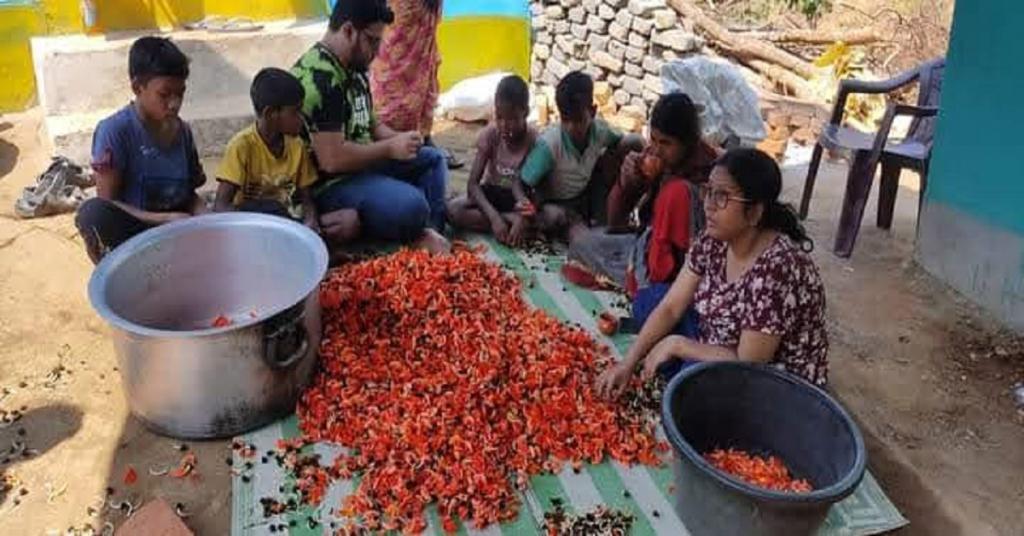Amongst the many beautiful seasons that we enjoy in this country, perhaps the most gloriously colourful is spring. In its grand splash of colours, it’s a season that brings in celebration and joy. Possibly that’s the reason why it’s also known as rituraj (or the king of all seasons) in Bengal.
Spring is the last season of Bengal’s seasonal cycle. Bengali months of Falgun-Chaitra make the spring season. The mild weather of spring, the natural scenery brings comfort to one’s soul. Deciduous trees grow new leaves. The mango tree is full of buds. Spring is also a symbol of new life, of new harvest, carts full of crop and prosperity. Palash and Shimul flowers blossom everywhere. The cuckoo’s hoot can be heard through the meadows in rural Bengal. In fact, it’s the call of the cuckoo that tells us that spring has arrived. Bees, swarms of butterflies hop on flowers to collect honey. The south wind of spring increases body heat. The world comes alive in the spring after overcoming the harshness of winter.
CJP’s Grassroots Fellowship Program is a unique initiative aiming to give voice and agency to the young, from among the communities with whom we work closely. These presently include migrant workers, Dalits, Adivasis and forest workers. CJP Fellows report on issues closest to their hearts and home, and are making impactful change every day. We hope to expand this to include far reaching ethnicities, diverse genders, Muslim artisans, sanitation workers and manual scavengers. Our raison d’etre is to dot India’s vast landscape with the committed human rights workers who carry in their hearts Constitutional values, to transform India into what our nation’s founders dreamt it to be. Please Donate Now to increase the band of CJP Grassroot Fellows.
Perhaps the most celebrated aspect of spring is its myriad of festivals. People of Purulia, Jhargram, Bankura districts become ecstatic after seeing flowers in shawl and palash trees. The famous Basanta Utsav is celebrated in Bengal during the spring season. The Shantiniketan spring festival, known as Dolyatra, is famous all around the world. People visit from all across the country and globally. Students in Visva-Bharati wear colourful sarees and sing songs together, act in plays, dance to Tagore’s songs. It’s a sight to be seen.
With the spring festival, herbal abeer is becoming very popular. Abeer is a colourful powder, also known as gulaal in the rest of India. In the recent past, chemical dyes have been rampantly used in spring festivals, in the form of abeer but the presence of various chemicals meant that people affected would have to go through a number of issues like rashes, burns and even long term sickness of the eyes and respiratory system. These physical problems have seemingly reduced a lot due to the availability of herbal abeer in the market. Moreover, Rural women are becoming self-reliant by making these herbal abeer.
According to the sources of the women who prepare herbal abeer from Burdwan, Dinajpur, Uluberia, the different materials used in the product are marigold flowers, turmeric, beetroot, rose, and palash flowers. There is obviously little to no risk of any harm to the skin, eyes or body with these natural and organic substances. The quality of Abeer is also excellent.

With every passing year, the demand for these herbal abeer are increasing. According to the current market rates, the price of 1 kg of herb Abeer is Rs.180. Hundreds of women are becoming independent, financially.
When I spoke to Apurba Phulmali, an abeer trader, she said, “the demand for herbal abeer, that we make has increased a lot. People are more inclined towards herbal products than chemical ones. Many people who are involved in this business are becoming profitable. But it’s my humbleI request to the state government to train village women to make more herbal abeer and if possible create more and more awareness across villages. Village women will become self-reliant if trained well.”
This report is part of CJP’s Grassroots Fellowship Program, and has been written by aspiring journalist and student activist Ripon Sheikh from Birbhum in West Bengal. In these reports Ripon looks at the people around him – migrant workers, the families they leave behind, agricultural labourers, women who do housework, rural artisans and young people, with a keen sense of compassion.
Meet CJP Grassroot Fellow Mohammed Ripon Sheikh
This young man, who has graduated with a B.Sc degree from Burdwan University, loves trivia. Sheikh’s passion to research and seek “unknown information about World History” has earned him many medals and trophies at various University and state-level Quiz championships, and youth festivals. Sheikh is a born orator and a natural community leader. He has the potential to represent his community, state and country at a global level one day. His immediate goal, however, is to find a job so he can support his parents.
Related:
When you buy earthen lamps, you light up a craftsperson’s home
How Sunderban’s Honey Collectors fight all odds to earn their living

